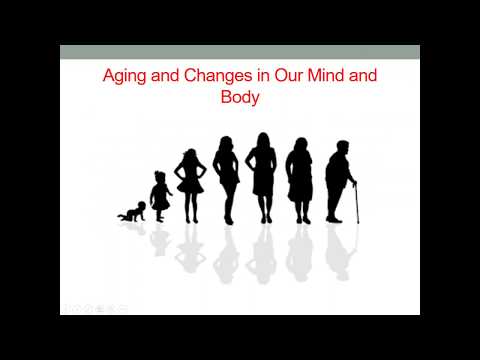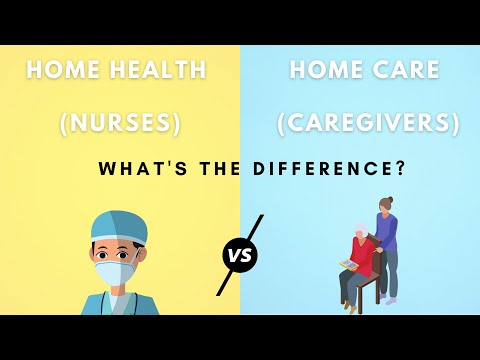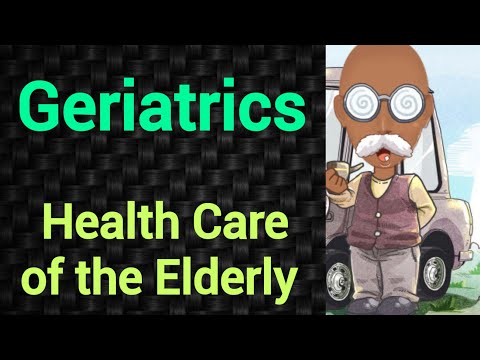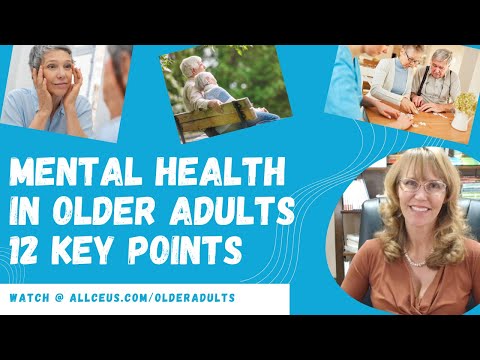Mental Health Concerns in the Elderly: What You Need to Know
Contents [show]
As we age, our mental health concerns change. Here’s what you need to know about mental health concerns in the elderly.
Checkout this video:
The elderly and mental health
As our population ages, the number of people over the age of 65 is expected to more than double by 2050. And with this aging population comes an increased risk for mental health concerns.
Depression is one of the most common mental health disorders in the elderly and can be brought on by a number of factors, including retirement, isolation, chronic health problems, and the loss of a spouse or friends. Anxiety disorders are also common in older adults, and can be triggered by changes in physical health, medications, and life circumstances.
Older adults are also at risk for developing dementia, which is a decline in cognitive function that affects memory, thinking, and judgment. While there is no one definitive cause of dementia, it is believed to be caused by a combination of genetic, lifestyle, and environmental factors.
It’s important to be aware of the signs and symptoms of mental health concerns in older adults so that you can get them the help they need. If you notice any changes in your loved one’s mood or behavior, don’t hesitate to reach out to their doctor or a mental health professional.
The causes of mental health problems in the elderly
The causes of mental health problems in the elderly are often complex and multi-factorial. As people age, they may experience a number of stressors and life changes that can contribute to the development of mental health problems. Some of the most common causes of mental health concerns in the elderly include:
-Loss of a loved one or close friend
-Retirement or job loss
-Decreased income or financial insecurity
-Chronic physical health problems
-Isolation or social isolation
-Loss of independence
These are just some of the many potential stressors that can lead to mental health problems in the elderly. It’s important to remember that not everyone will experience all of these stressors, and not everyone who experiences them will develop mental health problems. However, if you are experiencing any of these stressors, it’s important to be aware of the potential effects on your mental health and to seek help if you are having difficulties.
The effects of mental health problems in the elderly
Mental health problems are a growing concern in the elderly population. Depression, anxiety, and dementia are just some of the issues that can lead to mental health problems in older adults. These problems can have a profound effect on an individual’s quality of life and their ability to function independently.
Depression is one of the most common mental health problems in the elderly. It can cause feelings of sadness, hopelessness, and fatigue. Depression can also lead to physical health problems, such as high blood pressure and heart disease. Anxiety can cause feelings of worry, stress, and agitation. Dementia is a decline in cognitive function that can cause memory loss, confusion, and changes in mood and behavior.
Elderly adults who have mental health problems may have difficulty performing everyday tasks, such as bathing, dressing, and cooking. They may also have trouble sleeping, concentrating, and remembering things. In severe cases, mental health problems can lead to suicide. If you are concerned about an elderly loved one’s mental health, talk to their doctor or a mental health professional.
The treatments for mental health problems in the elderly
Mental health problems are not a normal part of aging. In fact, mental health problems can happen at any age. But the older a person gets, the more likely it is for mental health problems to develop. This is because aging can bring many changes. For example, an elderly person might:
-retire from work
-lose a spouse
-have more chronic health problems
-move to a new home
-be less able to do things on their own
All of these changes can be stressful. And stress can make mental health problems worse. Mental health problems in the elderly are often treated with medication and counseling.
The role of family and friends in supporting the elderly with mental health problems
Mental health problems are common among the elderly and can be caused by a variety of factors, including retirement, social isolation, physical illness, and bereavement. Family and friends play an important role in supporting the elderly with mental health problems.
There are a number of things that family and friends can do to support the elderly with mental health problems. First, it is important to be patient and understanding. Second, it is important to provide practical support, such as helping with tasks around the house or taking the person to appointments. Third, it is important to provide emotional support, such as listening to the person’s concerns and providing reassurance. Finally, it is important to information about Mental Health concerns in the elderly so that you can better understand what the person is going through.
If you are concerned about someone you know who is elderly and struggling with mental health problems, there are a number of support services available. These services can provide practical help, emotional support, and information about mental health concerns in the elderly.
The importance of mental health in the elderly
As we age, our physical health tends to decline. We become more susceptible to illness and disease, and we often have a harder time recovering from injury or illness. mental Health concerns are often an afterthought. But the fact is that mental health declines with age as well, and this can have a profound impact on our quality of life.
Mental health concerns in the elderly are often underdiagnosed and undertreated. This is due in part to the fact that many of the symptoms of mental illness–such as isolation, loneliness, depression, anxiety, and memory problems–are also common symptoms of aging. As a result, these problems are often chalked up to “normal” aging, when in fact they may be indicative of a more serious problem.
It’s important to be aware of the signs and symptoms of mental illness in the elderly so that you can get your loved one the help they need. Some common signs to look out for include:
-Withdrawing from social activities
-Loss of interest in previously enjoyed activities
-Changes in eating or sleeping habits
-Mood swings or persistent feelings of sadness or anxiety
-Problems with memory or concentration
-Feelings of worthlessness or hopelessness
If you notice any of these signs in your loved one, don’t hesitate to reach out to their doctor for help. Early intervention is crucial when it comes to mental illness, and there are many treatments available that can help improve quality of life.
The challenges of mental health in the elderly
Mental health concerns become more prevalent with age. The challenges of mental health in the elderly are varied and complex. Mental illness is not a normal part of aging. However, the likelihood of developing a mental health condition increases as people age.
There are many reasons why mental health concerns may increase with age. These include physical changes and illnesses, social isolation, bereavement, retirement, and lifestyle changes.
Mental health conditions common in older adults include depression, anxiety, and dementia. Many of these conditions can be treated effectively. However, older adults may be reluctant to seek help for mental health concerns due to stigma or feelings of shame. It is important to create an open dialogue about mental health in order to reduce stigma and encourage people to seek help when needed.
If you are concerned about your mental health or the mental health of someone you know, there are resources available to help. Talk to a doctor or other healthcare professional about your concerns. You can also contact a local mental health crisis line for support and information.
The future of mental health in the elderly
Mental health concerns in the elderly are often overlooked or go undiagnosed. This is due to a number of factors, including the myth that mental health problems are a normal part of aging, a lack of awareness of the signs and symptoms of mental illness, and a reluctance to talk about mental health issues.
It’s estimated that one in four adults aged 65 and over will experience a mental health problem at some point in their life. With the population aging, the number of people affected by mental illness is expected to rise.
There are a number of different mental health concerns that can affect older adults, including anxiety, depression, dementia, and isolation. These issues can have a significant impact on an individual’s quality of life and their ability to live independently.
Mental health problems can be caused by a number of different factors, including physical illness, changes in brain chemistry, grief, stress, and social isolation. It’s important to be aware of the signs and symptoms of mental illness so that you can get help if you or someone you know is struggling.
If you’re concerned about your mental health or the mental health of someone you know, talking to your doctor is a good first step. There are also a number of support groups and counseling services available for people affected by mental illness.
The resources for mental health in the elderly
The resources for mental health in the elderly are not always obvious. If you are concerned about an elderly family member or friend, there are some things that you can do to get them the help they need.
Mental health issues can manifest in different ways in the elderly. It is important to be aware of the signs and symptoms of mental illness in older adults so that you can get them the help they need.
Some common mental health concerns in the elderly include:
-Anxiety disorders
-Depression
-Dementia
-Substance abuse
The support for mental health in the elderly
The support for mental health in the elderly is important. Mental health problems are often under-diagnosed and undertreated in older adults. Many of these problems can be made worse by the normal physical changes that happen as people age.
The most common mental health problems in the elderly are depression, anxiety, and memory problems. These problems can lead to isolation, anxiety, and even suicide. It is important for family members and friends to be aware of the signs and symptoms of mental health problems in order to get the help that is needed.
If you are concerned about a loved one’s mental health, there are a few things you can do to help. First, talk to your loved one about your concerns. If they are open to talking, try to find out more about their symptoms and how they have been feeling lately. It is also important to have patience and understand that mental health problems can be very difficult to deal with.
If your loved one is reluctant to talk about their mental health, there are still things you can do to help. You can offer your support by being there for them when they need someone to talk to. You can also offer to help with day-to-day tasks or errands that may be difficult for them to do on their own. Finally, you can encourage them to see their doctor or a mental health professional if they are willing to do so.







